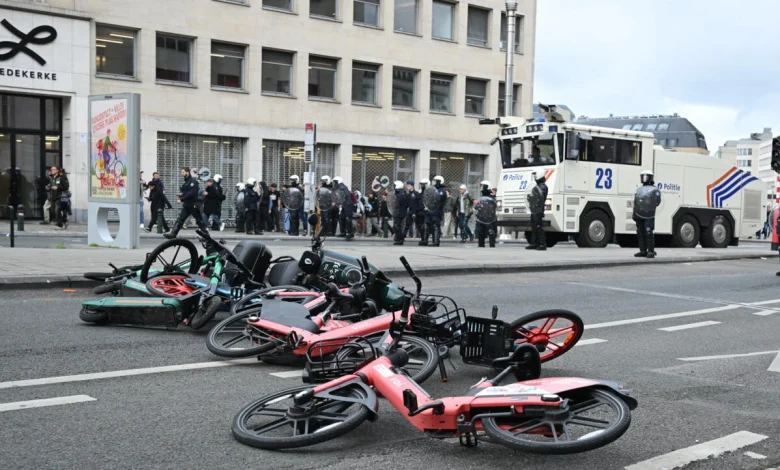Belgium braced for three-day national strike over budget cuts

Belgium on Monday braced for three days of nationwide strikes called by unions to protest the government’s proposed budget cuts and reforms to the pension system.
The strikes are taking place in three waves. Trains and public transport begin striking Monday, with national railroad company SNCB expecting to run two out of three trains, or just one out of three on some lines. Several Eurostars linking Brussels to Paris have been cancelled.
On Tuesday, public services such as schools, creches, and hospitals join the strike.
For Wednesday, unions have called for a full general strike covering all categories.
No flights are expected Wednesday at the country’s two main airports, Bruxelles-Zaventem and Charleroi.
The strikes are set to take place despite an agreement reached Monday morning by the government on the budget for next year.
Government reaches budget deal
Belgian Prime Minister Bart De Wever on Monday confirmed media reports that an agreement had been reached on the national budget for next year.
De Wever earlier this month set a Christmas deadline for his bickering five-party coalition to reach a deal, after they continued to disagree on how to repair government finances.
Agreement was reached during marathon talks that started on Sunday morning and went until early on Monday.
The deal includes tax hikes on share purchases, airplane tickets and natural gas and a new tax on banks, financial daily De Tijd reported.
Together with cuts in government spending, this should lower the government deficit by €9.2 billion ($10.6 billion) by 2029.
The budget deficit of the eurozone’s sixth-largest economy is set to hit 4.5% of gross domestic product this year, with debt of 104.7% of GDP, according to the central bank – well above the maximum agreed under EU budget rules.
The deal will not avert a three-day national strike against earlier announced reforms to the pension system, starting on Monday.
‘Contempt’
The strike was called by the main Belgian unions who are in a stand-off with De Wever over his efforts to shrink the country’s debt, one of the highest in Europe along with Greece, Italy and France.
In power since February, the Flemish conservative is trying to impose a major austerity effort through a series of unprecedented structural reforms concerning labour market liberalisation, unemployment benefits, and pensions.
But only a small number of the measures proposed by De Wever have been implemented so far, largely because of divisions within his five-party coalition.
He has given his coalition until Christmas to come to an agreement, also on his request for spending cuts to cover an increase in the military budget.
The strike is intended to put pressure on the parties as they negotiate between themselves.
This is “an appeal to Prime Minister De Wever and the entire government to put an end to the dismantling of social programs”, the unions stated in a press release.
The socialist union FGTB accused the prime minister of showing “contempt” and “disrespect” towards this social movement.
Earlier union efforts have had mixed results. Some tens of thousands of protesters marched through the streets of Brussels in mid-October to protest what they called “brutal” budget cuts.
(FRANCE 24 with AFP and Reuters)





